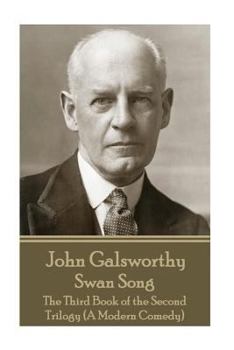John Galsworthy - Swan Song: The Third Book of the Second Trilogy (A Modern Comedy)
(Part of the The Forsyte Chronicles (#6) Series and A Modern Comedy (#3) Series)
Select Format
Select Condition 
Book Overview
John Galsworthy was born at Kingston Upon Thames in Surrey, England, on August 14th 1867 to a wealthy and well established family. His schooling was at Harrow and New College, Oxford before training as a barrister and being called to the bar in 1890. However, Law was not attractive to him and he travelled abroad becoming great friends with the novelist Joseph Conrad, then a first mate on a sailing ship. In 1895 Galsworthy began an affair with Ada Nemesis Pearson Cooper, the wife of his cousin Major Arthur Galsworthy. The affair was kept a secret for 10 years till she at last divorced and they married on 23rd September 1905. Galsworthy first published in 1897 with a collection of short stories entitled "The Four Winds". For the next 7 years he published these and all works under his pen name John Sinjohn. It was only upon the death of his father and the publication of "The Island Pharisees" in 1904 that he published as John Galsworthy. His first play, The Silver Box in 1906 was a success and was followed by "The Man of Property" later that same year and was the first in the Forsyte trilogy. Whilst today he is far more well know as a Nobel Prize winning novelist then he was considered a playwright dealing with social issues and the class system. Here we publish Villa Rubein, a very fine story that captures Galsworthy's unique narrative and take on life of the time. He is now far better known for his novels, particularly The Forsyte Saga, his trilogy about the eponymous family of the same name. These books, as with many of his other works, deal with social class, upper-middle class lives in particular. Although always sympathetic to his characters, he reveals their insular, snobbish, and somewhat greedy attitudes and suffocating moral codes. He is now viewed as one of the first from the Edwardian era to challenge some of the ideals of society depicted in the literature of Victorian England. In his writings he campaigns for a variety of causes, including prison reform, women's rights, animal welfare, and the opposition of censorship as well as a recurring theme of an unhappy marriage from the women's side. During World War I he worked in a hospital in France as an orderly after being passed over for military service. He was appointed to the Order of Merit in 1929, after earlier turning down a knighthood, and awarded the Nobel Prize in 1932 though he was too ill to attend. John Galsworthy died from a brain tumour at his London home, Grove Lodge, Hampstead on January 31st 1933. In accordance with his will he was cremated at Woking with his ashes then being scattered over the South Downs from an aeroplane.
Format:Paperback
Language:English
ISBN:1787371085
ISBN13:9781787371088
Release Date:March 2017
Publisher:Horse's Mouth
Length:244 Pages
Weight:0.85 lbs.
Dimensions:0.5" x 6.0" x 9.0"
Customer Reviews
1 rating
Moving conclusion to A Modern Comedy.
Published by Thriftbooks.com User , 20 years ago
Jon has returned to England. His return brings an end to the peace of mind of Fleur and Michael. Jon may have moved on and fallen in love again with Ann, but Fleur has never loved everyone but Jon. Swan Song has many of the usual Forsyte book tropes-- commentary on modern life offered through the observations of old men; June introducing us to the latest artistic schools; Forsyte paralysis when faced with the unblinking desire to do the wrong thing. As with the five books preceding this, it is all wonderfully well written. Michael and Fleur encountering people doing the Charleston is a particularly charming moment. Swan Song is so powerful partly because of the mixed emotions it has about Fleur. While Galsworthy gamely soldiers on to complete the cycle of doom begun by Soames and Irene, it is evident that he has a great deal of sympathy for Fleur. This installment shows her at her best as well as showing her at her worst. She is the swan of the book, singing her loveliest song. A worthy ending to the second Forsyte trilogy and a very readable instalment in this underappreciated series.





